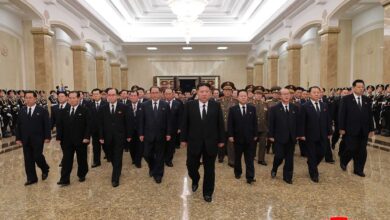The Cabinet meeting to discuss the draft State budget for 1957 went on from morning till late at night; the nation’s financial situation was so acute.
Listening to the keynote speech, Kim Il Sung examined the draft item by item. All of a sudden, he asked in which category were included the educational aid funds and stipends for the children of Korean residents in Japan. The speaker hesitated to answer.
Kim Il Sung had instructed this particular item to be included. But those working on the draft could not come up with any measure to secure the funds, no matter how hard they tried.
Three years after the armistice, the scars of war wounds were still visible in the factories, farming and fishermen’s villages and towns. Even if a factory had managed to be rebuilt out of the debris, its equipment was a problem. Even when the bomb craters in the fields had been filled, the pumps to irrigate the fields were in short supply. So many people were still living in dug-outs, and there were so many wounded veterans and old and invalid people, that the State could scarcely look after them. Money was the biggest problem everywhere.
The speaker finally replied that, in view of the acute financial situation, that item had not been included in the State budget, but was to be specifically added to the short-term foreign exchange plan.
After a while, Kim Il Sung said firmly: No! We must send the funds, and that at once. Even if we can’t build one or two factories, we must send the money for children’s education to our compatriots suffering hardship in that alien land.
Dead silence hung in the room.
He continued, looking around: So long as there are compatriots in Japan and children who need education, we must continue to send them funds. Therefore, it must not be a temporary concern. We must set up a new budget item of “educational aid funds and stipends for the children of Korean residents in Japan,” and maintain it as a permanent work.
This was how the new item was set up.

